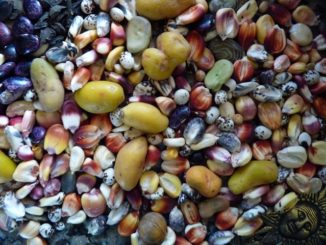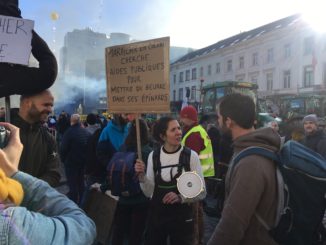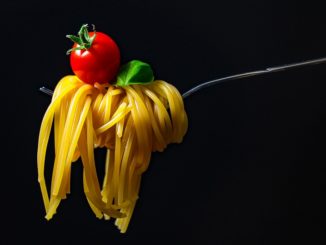Our own Oliver Moore has been busy in Ireland talking and writing about about the (lack of an) Organic Farming Scheme in recent weeks. He was on the TV:
with demand for #organics growing, why is demand way outstripping supply in Ireland and is it time to reopen our organic scheme #ettg @ellamcsweeney pic.twitter.com/uhFnAwo409
— Paula Williams (@paulawilliamss) February 22, 2018
You can watch the full show here (national restrictions may apply) And you can listen to him on the radio too on the Saturday morning show Countrywide.
Last week he told us about the confusion the Irish Department of Agriculture has with regard to opening or not opening the Organic Farming Scheme.
Schrödinger’s Cat and the State of the Irish Organic Farming Scheme
While this week he covered the recent Biofach 2018 event – the world’s largest organic trade show for the Irish Farming Examiner.
Below is what he wrote about what the Irish organic certification bodies – IOFGA and the Organic Trust – have to say about the lack of an Organic Farming Scheme. (also originally published in the Irish Examiner newspaper)
Both Irish organic certification bodies – IOFGA and the Organic Trust – have been making strong representations to the Department over Organic Farming Scheme (OFS) not reopening.
There are opportunities for reallocation of underspends. The Organic Trust earmarked for the Department and the relevant minister (Andrew Doyle TD) “various underspends in other schemes such as the Genomic Scheme and asked for a re-allocation of such underspends to the OFS.”
However, the Department informed the organisation that “these budgets were not so ‘fluid’ and could not be readily re-allocated – specific permission would have to be sought from the Brussels”.
Nevertheless “we requested that such permission be sought. No subsequent update was provided”, while requests for meetings to progress the matter have gone unanswered.
“The Organic Trust strongly supports the re-opening of the OFS. Several hundred application packs have been despatched since 01.01.2016 to those interested in converting to organic production – enquiries are being received on a daily basis and a significant proportion of those enquiring have already undertaken the Fetac Level 5 compulsory course in organic production – many of these were not quite ready to convert when the scheme re-opened in the autumn of 2015 but have since put the building blocks in place to facilitate conversion to organic production. “
IOFGA too favour reopening the OFS and have also made representations to this effect. Gillian Westbrook of IOFGA points out that there are three sectors in particular within organic where there is a real demand – tillage, horticulture and diary.
More Irish grown organic tillage is especially important to consider, and one of the many reasons is Brexit, Westbrook emphasises. She notes that it’s not just cereals from the UK being used as feed on Irish farms – organic and conventional – but the UK is a hub for cereals importation from elsewhere. So any tariffs on product into and out of the UK could have negative cost implications in Ireland.
This is especially the case when it’s not currently possible for tillage farmers, or farmers considering tillage, to join the OFS.
She adds “There is TAMS money left unclaimed, GLAS hasn’t been all spent. It’s not big money the OFS needs – it’s only a few million. Look at what would happen if more organic tillage farmers came in – everyone benefits. There is a deficit in porridge, in feed. Tillage could lead to the development of Irish organic bakery products. We need to be ambitious. The gross profit per hectare (for organic tillage) is attractive and the payments are good.”
She adds: “One of the reasons we can’t get more processed organic dairy is because of lack of supply for the bigger contracts.”
The lack of “a coherent strategy” is frustrating: “Successful countries (in terms of numbers converting to organic) have a steady flow of people coming in, and that’s attractive for farmers. In Ireland there’s nothing for 5 years at a time. So in 2020 everyone is out of organics. So what confidence does that give processors? They need a continuity of supply. Yet at a policy level the schemes open and close.”
The logic of funding organic is clearly laid out in numerous EU and Department of Agriculture documents. “Support is paid for carrying out the environmentally favourable production methods which are intrinsically linked to organic production” states the organic farming measure itself (Measure 11).
It continues that organic farming contributes to various “rural development objectives and priorities”. These are listed as biodiversity, water management (fertilizer and pesticide management), preventing soil erosion and improving soil management, resource efficiency and a shift towards a low carbon and climate resilient economy, fostering carbon restoration and sequestration.
Frustratingly, as Gillian Westbrook puts it, “we’ve an existing target for 5% organic but we ring fence funding to get 2%. It’s like paying for two bedroom house and expecting a five bedroom house. It doesn’t make sense.”




